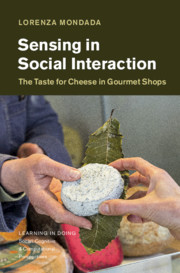Book contents
- Sensing in Social Interaction
- Learning in Doing: Social, Cognitive, and Computational Perspectives
- Sensing in Social Interaction
- Copyright page
- Contents
- Figures
- Tables
- Extracts
- Acknowledgments
- Part I Sensoriality in Interaction
- 1 From the Senses to Sensing in Interaction
- 2 Methodology
- Part II Looking and Knowing
- Part III Sensing Together
- Part IV Tasting, Assessing, and Making Decisions
- Appendix: Transcription Conventions
- Bibliography
- Index
- Series page
2 - Methodology
from Part I - Sensoriality in Interaction
Published online by Cambridge University Press: 21 October 2021
- Sensing in Social Interaction
- Learning in Doing: Social, Cognitive, and Computational Perspectives
- Sensing in Social Interaction
- Copyright page
- Contents
- Figures
- Tables
- Extracts
- Acknowledgments
- Part I Sensoriality in Interaction
- 1 From the Senses to Sensing in Interaction
- 2 Methodology
- Part II Looking and Knowing
- Part III Sensing Together
- Part IV Tasting, Assessing, and Making Decisions
- Appendix: Transcription Conventions
- Bibliography
- Index
- Series page
Summary
Once presented the interactional perspective on sensoriality proposed by this book (Chapter 1), Chapter 2 offers a methodology able to document and to analyze embodied sensory engagements in social interaction. It discusses fieldwork, video-recordings, and multimodal transcriptions, as well as alternate approaches, showing the coherence and adequacy of a video and multimodal methodology for studying multisensoriality. It also presents the empirical case that will be developed in the book, focusing on food as an exemplary field in which all the senses play a crucial role. It presents the field of study, an exemplary activity in which participants sensorially engage with food: practices of looking, touching, smelling, and tasting cheese in gourmet shops. The empirical data on which the remaining of the book is based are video-recordings of shop encounters between cheese sellers and customers, gathered in a dozen of cities in Europe, drawing on a dozen of different languages. This unique and rich corpus of video data enables to develop a systematic analysis of the detailed way in which it is possible, within a praxeological, interactional, multimodal approach, to study multisensoriality in action.
Keywords
- Type
- Chapter
- Information
- Sensing in Social InteractionThe Taste for Cheese in Gourmet Shops, pp. 62 - 112Publisher: Cambridge University PressPrint publication year: 2021



